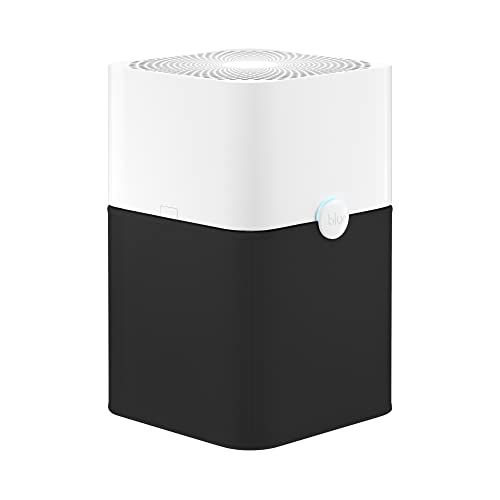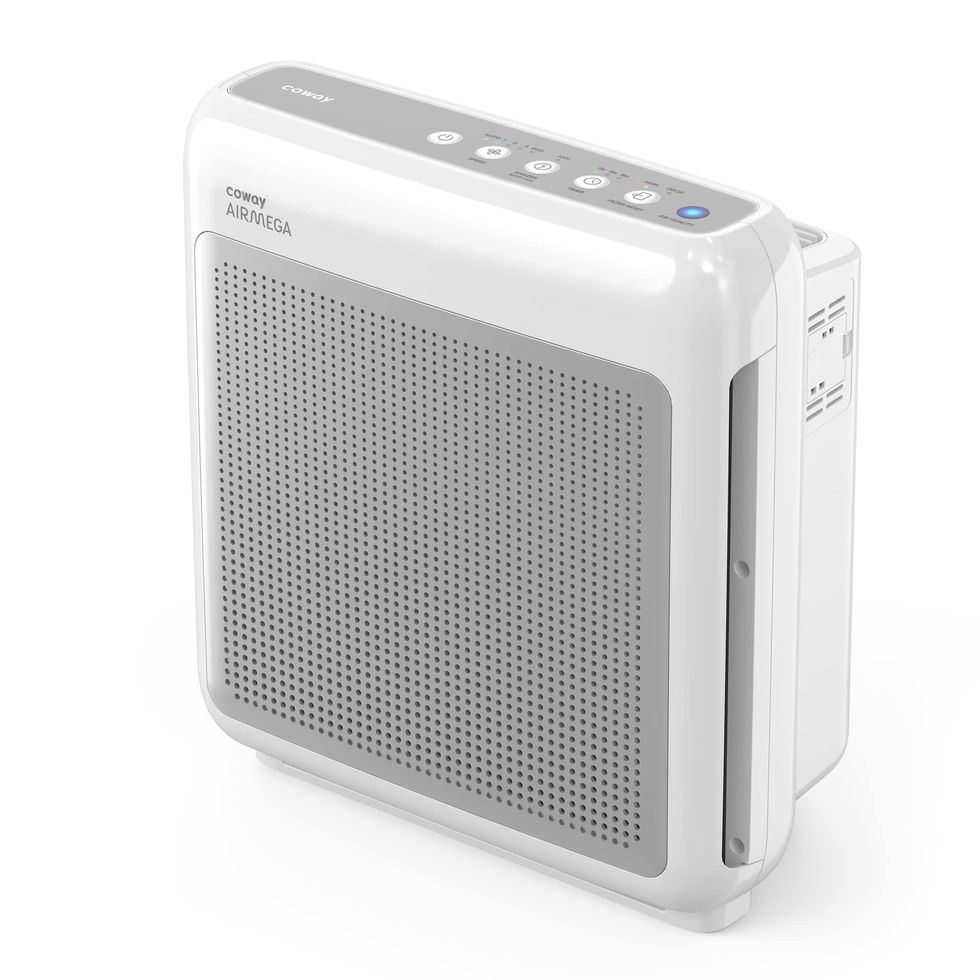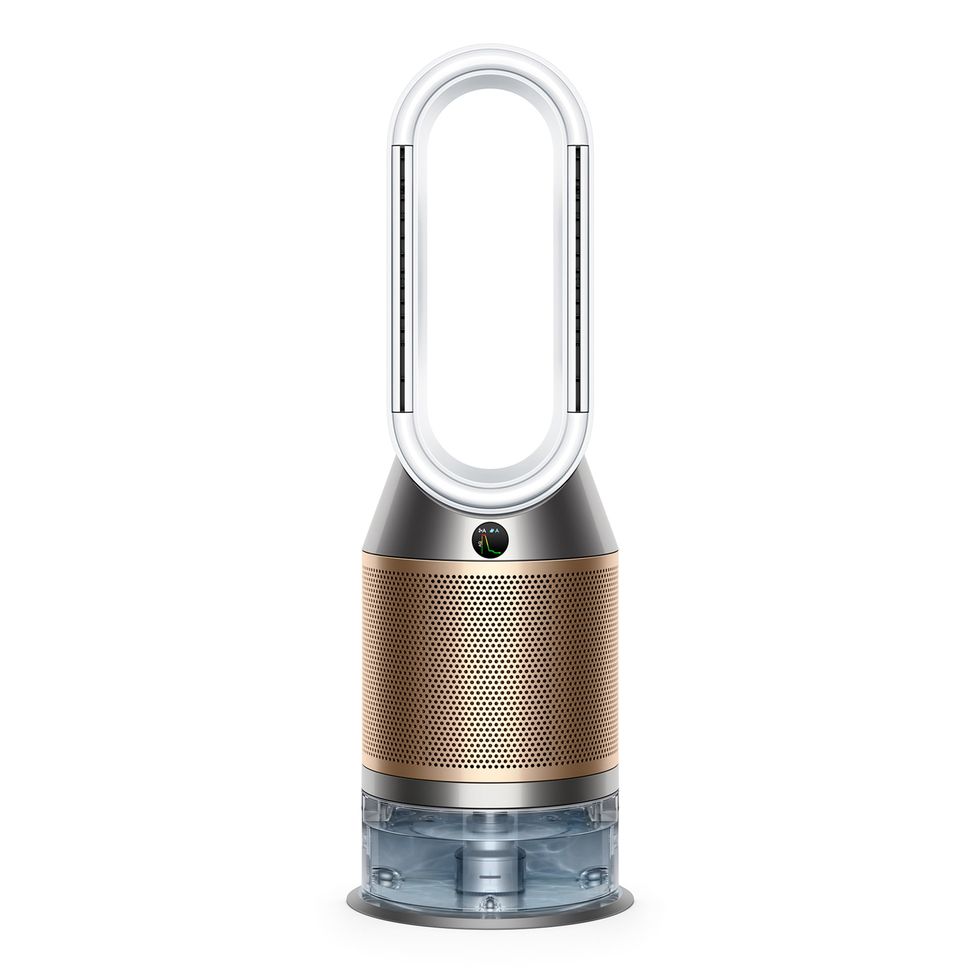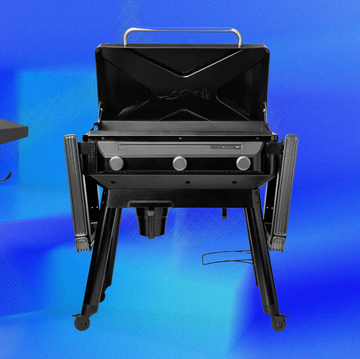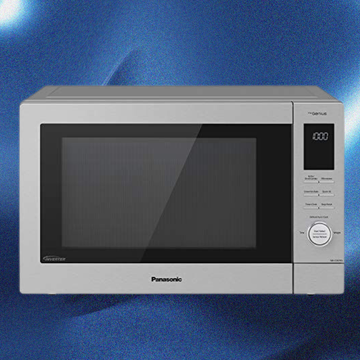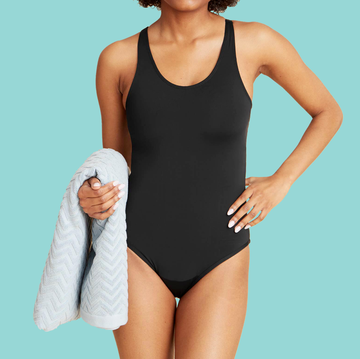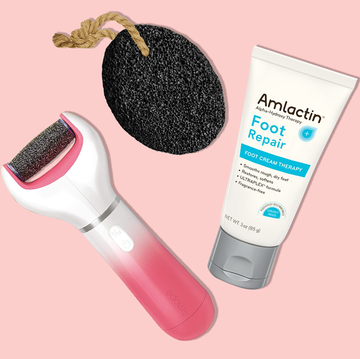8 Best Air Purifiers for Pets, Tested and Reviewed
Enjoy your furry friends without compromising clean indoor air.

We've been independently researching and testing products for over 120 years. If you buy through our links, we may earn a commission. Learn more about our review process.
If you’re one of the 82 million U.S. households with a pet, you’re not just dealing with fur on the furniture and paw prints on the floor, you’re also breathing in more allergens. Pet hair, dander, saliva, and even urine can trigger allergies, especially in homes with cats and dogs.
Regular bathing and vacuuming can help keep allergens in check, but an air purifier is one of the most effective ways to improve indoor air quality. According to Dr. John McKeon, CEO of Allergy Standards and Principal at the iAIR Institute, air purifiers are key in managing indoor air pollution and removing airborne allergens. Choosing the right air purifier can make a noticeable difference in reducing pet-related allergens and making your home more comfortable.
Our experts in the Good Housekeeping Institute continuously test air purifiers in our Labs and homes to find the models that combine efficacy with ease of use. In the last five years, we’ve reviewed close to 50 air purifiers, including models that are specially designed for pet owners, which include features like a pre-filter (for capturing airborne fur) and activated carbon (to help neutralize odors).
Pros
Effective three-part filtration system, including washable pre-filter
Helps neutralize odors
Quiet operation
Cons
Not fit for larger spaces
Blueair is a top brand with our experts based on its superb filtration used across its line of air purifiers. We particularly like the 211+ model for pet owners because of its three-part filtration system, which provides multi-level protection against contaminants of all sizes — not just dander and pet hair, but also cooking fumes, dust mites and pollen. "The washable fabric pre-filter that encases the device did a good job of snagging fur, dust and other large particles in our Lab and home tests," said Nik Greenwald, data engineer at the Good Housekeeping Institute.
Next in the multi-layered defense is the true HEPA filter, which captures smaller particles down to 0.1 microns, the smallest of all the air purifiers we tested. Then there's the carbon activated filter to help neutralize odors caused by urine and saliva. That's enough to clear up to 99.97% of pet-generated pollutants across 540 square feet, which is the ideal size for a family room or a large office (in case you like to take your fur baby to work!). An underrated feature of this air purifier that might be its best — you'll barely notice it running since it's so quiet.
| Recommended coverage area | 540 sq ft |
|---|---|
| Maximum coverage area | 2,592 sq ft |
| Filter type | Fabric pre-filter, True HEPA and carbon activated |
| Dimensions | 13" x 13" x 20" |
| Weight | 13 lbs |
| Filter replacement cost | $70 |
| CADR | Smoke, pollen and dust: 350 |
Pros
True HEPA filters particles down to 0.1 microns
Activated carbon filter adsorbs bad odors and some harmful chemicals
Cons
Noisy
Many homes need multiple air purifiers — one for each room. With this budget-friendly model, you can outfit your home for the cost of a single premium purifier.
Despite its lower price, it doesn’t compromise on performance. The true HEPA filter captures pet dander, hair and airborne allergens down to 0.1 microns, making it ideal for homes with shedding cats and dogs. The activated carbon filter helps reduce pet odors, though its effectiveness may be limited in humid environments.
In our tests, it performed especially well in small to mid-sized rooms (up to 215 sq. ft.), quickly improving air quality after just an hour of use. One tester noted that the air felt fresher and more breathable even after running it for a short period. However, it can be relatively noisy on the highest setting, so if you need an ultra-quiet operation, a higher-end model might be a better fit.
For pet owners looking for a cost-effective way to reduce allergens and odors, the GermGuardian is an excellent value that delivers reliable performance without breaking the bank.
| Recommended coverage area | 215 sq ft (recommended) |
|---|---|
| Maximum coverage area | N/A |
| Filter type | Activated carbon pre-filter and true HEPA |
| Dimensions | 9.75" x 9.75" x 12" |
| Weight | 7.2 lbs |
| Filter replacement cost | $33 |
| CADR | Not listed |
Pros
Sleek, space-efficient design
Intuitive controls
Effective, multi-level air cleaning
Cons
On the pricey side
Has an ionization mode, which we don't recommend
Several innovations set the Rabbit Air MinusA2 air purifier apart from the competition, but we’ll start with its streamlined design. “It’s the first unit we’ve had in the Lab for testing that can be mounted to the wall,” said Greenwald. “The unit installs easily which will save floor space, especially compared with the largest standing models, which can get quite bulky.” Another tester noted, "Mounting the Rabbit on my wall keeps my floors clear and I haven't had to dust nearly as much since I started using it."
Besides its sleek, space-efficient design, the Rabbit Air is also engineered to pull a range of pollutants from the air, thanks to its multiple levels of filtration. That includes the all-important True HEPA filter, rated to capture 99% of particulates less than 0.1 microns in size. There’s also a pre-filter for pet hair and other larger allergens, an activated carbon filter to neutralize odors and a custom pet filter designed specifically for dander. While our Lab and home tests are still ongoing, the unit has delivered solid performance results so far. It's on the pricey side, but it is also living up to its ultra-quiet claim, especially in silent mode, when its fan is literally whisper-quiet; even on the highest "turbo" setting, the fan only gets up to around 49 decibels, or as loud as a soft conversation.
An important caveat: The MinusA2 has an ionization setting, which our experts don't recommend with any air purifier, since ionizers can release small amounts of ozone (an irritant that can exacerbate existing respiratory conditions) and the science on ionizer efficacy and safety is still inconclusive. While we prefer purifiers without any ionization mode, at least with the MinusA2 the process for turning it off is straightforward and there is an indicator light on the face of the unit that clearly indicates if it's in active ion mode.
| Recommended coverage area | 815 sq ft |
|---|---|
| Maximum coverage area | Not listed |
| Filter type | Pre-filter, True HEPA, carbon activated filter and custom pet filter |
| Weight | 19.4 lbs |
| Dimensions | 7" x 21.4" x 20" |
| Filter replacement cost | $105 |
| CADR | Smoke: 180, pollen: 200 and dust: 193 |
Pros
Intuitive controls
Built-in sensor monitors air quality
Another version offers smart home capabilities, including voice control
Cons
Noisier operation on higher speeds
The brand best known for bleach and other household cleaning supplies recently entered the air purifier category with this true HEPA unit. Based on our initial testing experience, Clorox is worth a look if you’re in the market for an air purifier that delivers capable performance at a decent price.
Recommended for medium-sized rooms, the Clorox 11010 air purifier is a good example. Thanks to its True HEPA Filter, it's effective at removing airborne particulates, especially on higher fan speeds; the brand says the device will clean the air in a 225-square-foot room up to five times an hour. One downside is that it is quite noisy when running at full tilt, so you might want to consider a quieter model if you’ll be running the air purifier in a bedroom (though some testers tell us they didn’t mind the white noise effect of louder devices). We also evaluated Clorox's Large Air Purifier, designed for spaces up to 1,500 square feet. Pet owners will appreciate the activated carbon filter on both units that does a solid job neutralizing bad odors. (We also looked at the new Tabletop Air Purifier, but we don't recommend it because it doesn't feature activated carbon.)
In our usability tests, Clorox earned high marks for the intuitiveness of its LCD display. "We also like the fact that the onboard sensor monitors air quality in the room and displays the information clearly,” said Greenwald. For smart home enthusiasts, Clorox offers an Alexa-enabled version of its air purifier that lets you control the device from anywhere via the smartphone app and operate it via voice control through any Amazon smart speaker.
| Recommend coverage area | 225 sq ft |
|---|---|
| Maximum coverage area | 1,000 sq ft |
| Filter type | Pre-filter, True HEPA and carbon activated filter |
| Weight | 7.3 lbs |
| Dimensions | 8.74" x 8.74" x 14.65" |
| Filter replacement cost | $40 |
| CADR | Smoke: 206, pollen: 232 and dust: 219 |
Pros
Excellent defense against heavy shedding pets
Easy-to-clean pre-filter
Carbon activation neutralizes odors
Cons
Doesn't clean air as quickly as other models
Our experts say this Coway is one of the best air purifiers for owners with a heavy-shedding pet, whether a Himalayan long-haired cat or a Bearded Collie. It can also help with pet odor, thanks to its carbon activated filter, which proved powerful in our home tests.
Testers liked the easy-to-clean pre-filter that captures hair, fur and other large particulates before they reach the inner HEPA filters. Indicator lights give the heads up when filters need to be cleaned or replaced.
The Airmega 200M has the same rectangular shape our experts have come to expect from Coway. Though the design allows ample surface area for the filter, it means air can only be drawn in from the side of the machine, which slows down the process of purifying. The brand recently released its first cylindrical model, the Airmega 100, which can take in air from 360 degrees, which Coway says will deliver faster air cleaning. We will report back on the results once performance testing is complete.
| Recommended coverage area | 361 sq ft |
|---|---|
| Maximum coverage area | 874 sq ft |
| Filter type | Pre-filter, True HEPA and carbon activated |
| Dimensions | 9.60" x 16.80" x 18.30" |
| Weight | 12.5 lbs |
| Filter replacement cost | $57 |
| CADR | Not listed |
Honeywell InSight HEPA Air Purifier

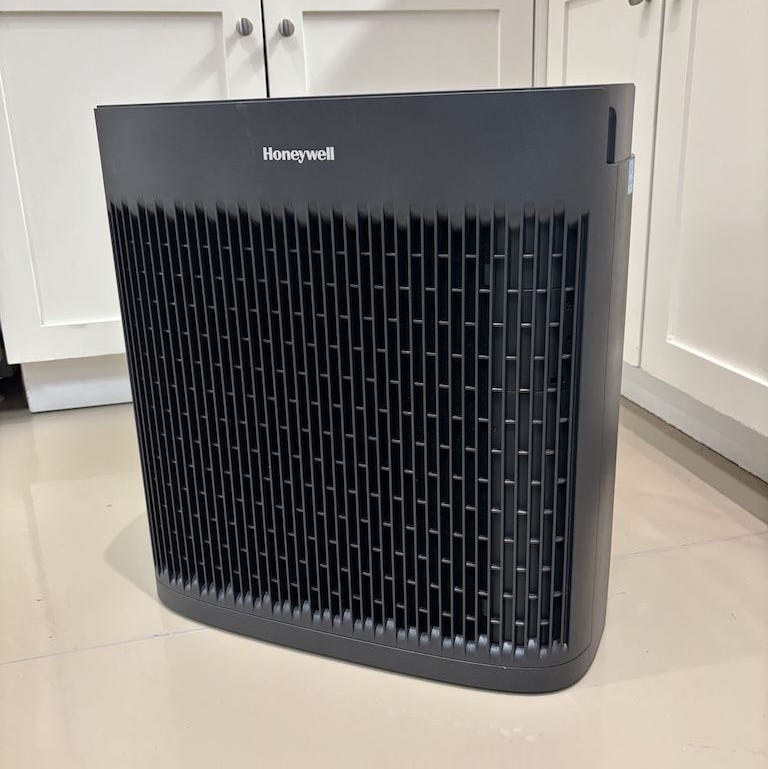
Pros
Onboard sensor provides realtime feedback about air quality
Low-cost replacement filters
Cons
Big, boxy design takes up a lot of space
This Honeywell air purifier excels at trapping pet dander and airborne allergens with its true HEPA filter, helping to improve indoor air quality. Ideal for rooms up to 360 square feet, it captures up to 99.97% of allergens, including dust, pollen, pet hair and smoke.
Our testers appreciated the constant air quality updates provided by the built-in VOC (volatile organic compound) sensor, which automatically adjusts cleaning levels based on detected pollutants. The color-coded Air Quality Indicator makes it easy to see real-time air conditions from across the room. One tester who evaluated the unit for several months was impressed, “I was shocked at how well it detected irritants in the air.”
Another highlight is the affordable replacement filter cost, which is a major plus if you plan to run multiple units. For pet owners needing extra protection, Honeywell offers specialty filters targeting pet allergens, smoke and VOCs.
| Recommended coverage area | 360 sq ft |
|---|---|
| Maximum coverage area | N/A |
| Filter type | Pre-filter and true HEPA |
| Weight | 13 lbs |
| Dimensions | 17.7" x 18.8" x 10" |
| Filter replacement cost | $25 |
| CADR | not listed |
Pros
Fast, powerful air cleaning
Sleek, intuitive app
Onboard sensor monitors air quality in the room
Cons
Expensive, plus high operating costs
Takes up a lot of room
Though it may not be cheap, this Dyson air purifier is loaded with innovations that make it worth the splurge, according to our experts. "It was one of the fastest models at reducing particulate matter in our test chamber, so it should do the job on pet allergens," said Greenwald. The machine's unique catalytic filter, combined with True HEPA filtration, vanquishes contaminants down to 0.3 microns.
The Dyson also has one of the most sophisticated onboard air monitors we’ve seen on a purifier. For example, it measures the presence of particulate matter (such as dander and pet hair) and relays the data, along with ambient temperature and humidity levels, to a sleek app. “The interface on the app is extremely intuitive and should give users a very clear picture of their home’s indoor air quality,” said Greenwald.
Costing $80, the Dyson’s replacement filter is among the most expensive. The air purifier also takes up a lot of space, standing a full 3 feet tall. If neither of those factors are deal breakers, the Dyson Humidify + Cool Formaldehyde won’t disappoint when it comes to clearing your home's air of pet contaminants.
| Recommended coverage area | 800 sq ft |
|---|---|
| Maximum coverage area | Not listed |
| Filter type | Fabric pre-filter, True HEPA and catalytic filter |
| Dimensions | 12.30" x 12.30" x 36.33" |
| Weight | 18 lbs |
| Filter replacement cost | $80 |
| CADR | Not listed |
Pros
Robust cleaning power
Sleek front panel
Built-in air monitor
Cons
High price and operating costs
Ionization setting not recommended by our experts
Got a big house with several dogs or cats? The 751i Air Purifier merges advanced filtration technology with a powerful fan for massive cleaning power across 1,300 square feet. It's the only other model in our round-up (along with the Blue Pure 211) that can capture contaminants down to 0.1 microns. This is also one of the better-looking models to pass through our Labs, with its sleek front panel available in six colors. It's also one of the smartest, thanks to its built-in laser sensor technology that monitors air quality in the room and adjusts the fan speed accordingly.
The combination of peak performance and high design will cost you extra: Besides the steep upfront price, the filter replacement price is several times that of other models. Additionally, our safety experts point out that the Alen has an optional ionization setting designed to combat even more pollutants. We don’t recommend this feature on any air purifier since it can produce ozone, a lung irritant. But even without the use of the ionization setting, the Alen should capture plenty of pet hair and allergens, while looking good in the process.
| Recommended coverage area | 1,300 sq ft |
|---|---|
| Maximum coverage area | Not listed |
| Filter type | True HEPA with carbon activated layer |
| Dimensions | 11.5" x 18.5" x 27" |
| Weight | 27 lbs |
| Filter replacement cost | $100 |
| CADR | Pollen and dust: 347 |
How we choose the best air purifiers for pets

Our product experts at the Home Improvement & Outdoor Lab keep up with the latest models and innovations in the air purifier category. We continuously survey the current marketplace to identify the best air purifiers for homes with pets that you’re most likely to find at stores and online.
We also attend trade shows and industry events, like the Consumer Electronics Show (CES) and the Inspired Home Show to stay on top of the latest innovations in indoor air quality. Next, we identify brands that have performed the best and proved the most reliable through more than a decade of air purifier testing at the Good Housekeeping Institute. We also consider newer brands with unique features or technology.
Over the last five years, more than 50 air purifier models have been considered for testing.
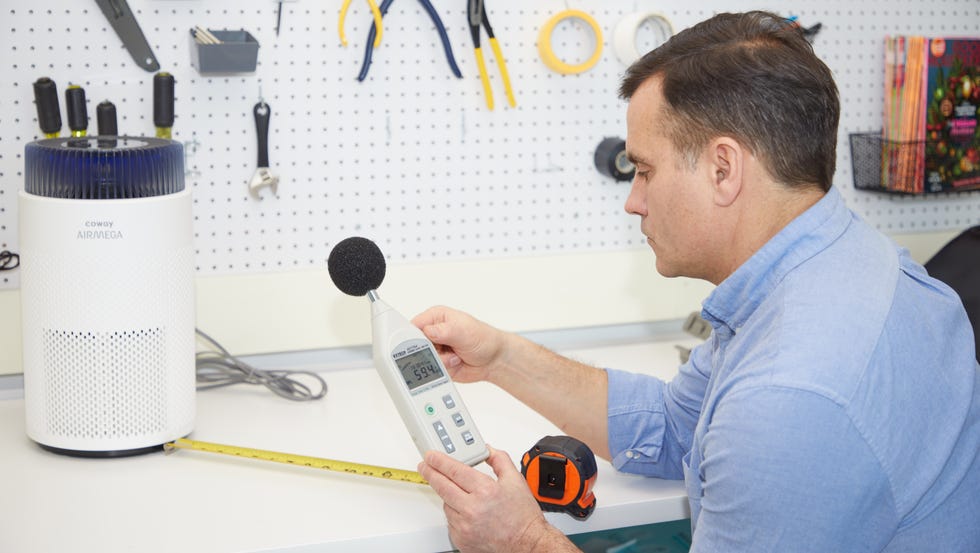
Based on an extensive preliminary review of technical data, including claimed coverage area, type of filtration and odor-fighting add-ons, our review team selects models for hands-on testing. This testing takes place both in our Lab and in our homes, allowing us to see how they perform in real-world conditions (e.g., homes covered in pet hair).
Controlled Lab tests measure an air purifier's ability to capture specific contaminants, such as smoke and other VOCs (volatile organic compounds). At-home testing checks for general improvement to freshness, as well as overall usability. Our consumer testers measure factors like ease of set-up, intuitiveness of controls and how easy it is to locate and replace the filter (or clean it, when applicable).
Following the combined 50-plus hours of data review, Lab testing and at-home evaluations, we arrived at our list of expert-approved air purifiers for pets.
What to look for when shopping for the best pet-friendly air purifier

To zero in on the ideal air purifier for your needs, weigh the following factors:
✔️ Coverage area: Manufacturers typically list how much square footage a purifier is designed to cover. You might see multiple areas listed, for example, one for the coverage provided in one hour and another for the coverage provided in five hours. Our experts recommend checking the lower number since you'll likely want a device that delivers quick purification.
✔️ Filtration: Most top-performing air purifiers use mechanical filters with a dense web of fine fibers that trap particles from the air as it is pushed through by a fan.
- True HEPA filters use a very fine mesh certified to capture 99.97% of particles measuring at least 0.3 microns (and in some cases, down to 0.1 microns) in diameter. Our bottom line advice is that the best cleaning power comes from a true HEPA filter.
- "HEPA-like" filters have not been certified to meet that standard.
- Pre-filters are included in some air purifiers to capture dust and other larger particulates. Our experts like this feature.
- Activated carbon filters are designed to neutralize foul odors, including those generated by pets.
✔️ Filter replacement cost: This operating cost tends to be higher with air purifiers that use multiple filters, which is why our experts say it's important to match the air purifier to your needs, so you're not spending more than you need to.
✔️ CADR: Short for "clean air delivery rate," CADR is an industry measure of how much clean air the purifier delivers in a given test environment for various pollutants; it is typically reported in cubic feet per minute. The rule of thumb is that the CADR should be at least two-thirds of the area that the air purifier will be cleaning. So if your room is 300 square feet, look for a CADR of 200 or higher. Not all manufacturers list CADR, but we included it in our product reviews for those that do.
Where is the best place to put an air purifier?

The first and most important rule is to place the air purifier near the source of the problem. In kitchens, this usually means in close proximity to the cooktop, where the purifier will help capture odors and fumes. If you have a pet, place the air purifier(s) wherever they spend the most time. It’s also a good idea to position air purifiers away from walls and other objects that could impede airflow. The more circulation the better, to allow the purifiers to draw in as much contaminated air as possible.
How often should air purifier filters be replaced?

This is a critical maintenance step with air purifiers because, as Dr. McKeon of the iAIR Institute explained, "a loaded air purifier filter loses its filtration performance over time." Many units have a filter replacement indicator on their display. If not, our experts recommend replacing the filter every 6 to 12 months, depending on how often you run the purifier and the air quality in your home.
Why trust Good Housekeeping?

Dan DiClerico has tested and written about air purifiers extensively for more than 20 years. He has also spearheaded numerous investigative reports on the topic of indoor air quality, working closely with outside experts from government, industry and the home services space. As Director of Home Improvement & Outdoor at the Good Housekeeping Institute, Dan oversaw the latest round of air purifier testing in our Labs, as well as the continuous in-home, survey-based consumer testing that allows us to evaluate these devices in real-world conditions.
Nikolas Greenwald, data engineer at the Institute, contributed in-Lab testing of air purifiers for this report. Nik regularly evaluates the top performers and newest entries in the sector to find the best ones on the market. He has a bachelor's degree in chemical engineering and applies his knowledge of fluid dynamics and filtration processes to finding strong contenders in the home HVAC space.
Having written thousands of product reviews and how-to articles on all aspects of home ownership, from routine maintenance to major renovations, Dan (he/him) brings more than 20 years of industry experience to his role as the director of the Home Improvement & Outdoor Lab at the Good Housekeeping Institute. A one-time roofer and a serial remodeler, Dan can often be found keeping house at his restored Brooklyn brownstone, where he lives with his wife and kids.
As a data engineer in the Good Housekeeping Institute, Nik (he/him) works with all of our Labs to develop testing protocols and manage data collection and analysis. Before joining Good Housekeeping in 2022, Nik worked in the labs of MIT and Regeneron, working on projects ranging from chemical inventory and reporting to the development of bioassays. He holds a degree in chemical engineering from Northeastern University.


The 15 Best Natural and Organic Sunscreens
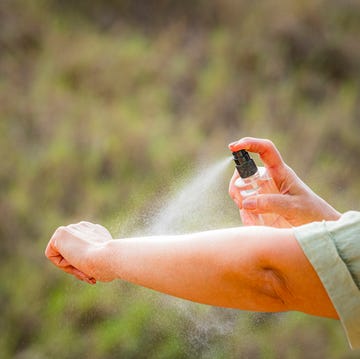
The Best Mosquito Repellents
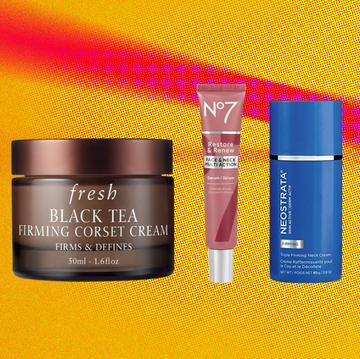
The Best Neck Firming Creams
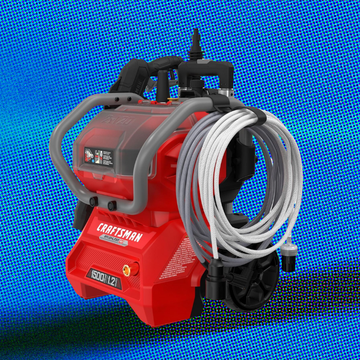
The Best Pressure Washers
